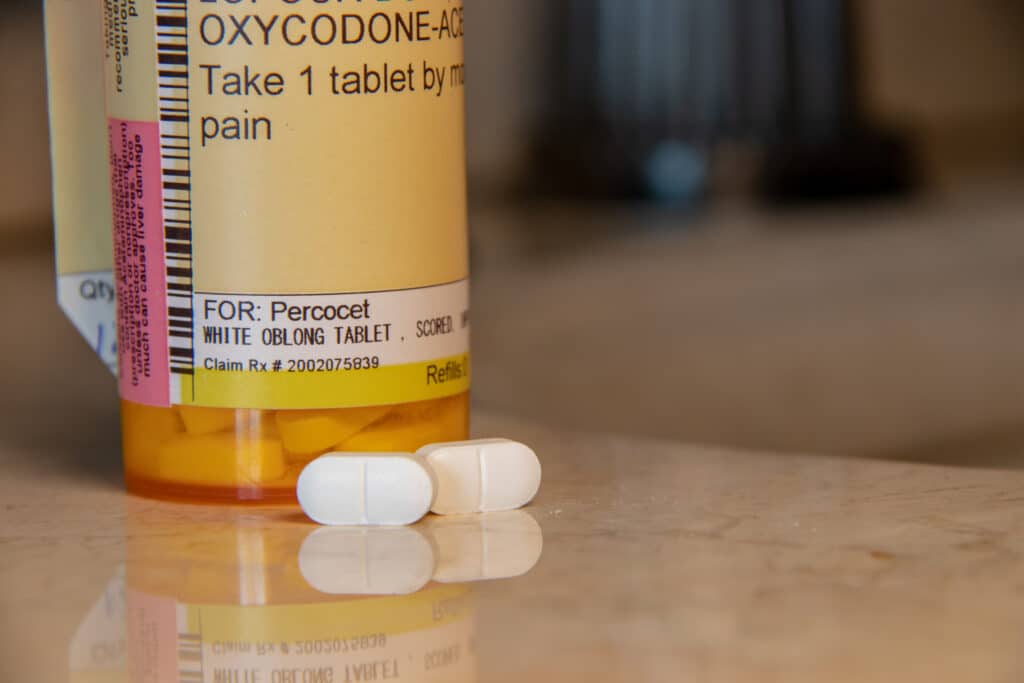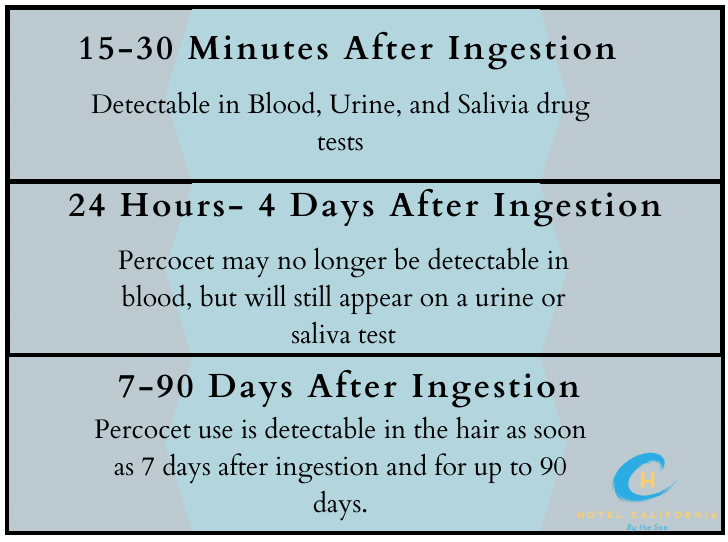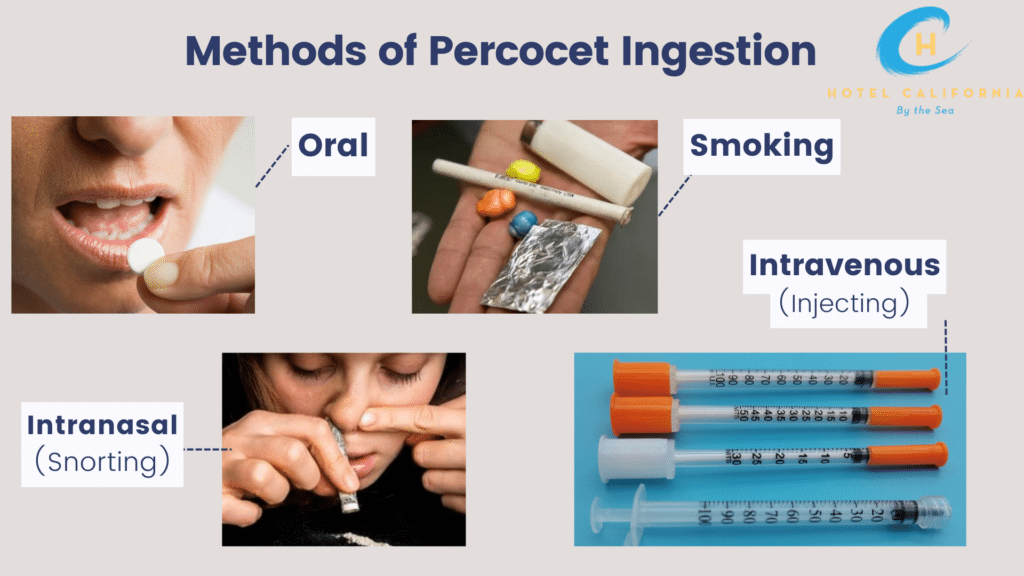How long does Percocet stay in your Urine?
Percocet is an opioid medication and is considered one of the most addictive prescription drugs available. Percocet contains a combination of acetaminophen, an analgesic; and an immediate-release oxycodone, an opioid. According to the United States Department of Justice, more than an estimated 13 million Americans abuse oxycodone medications such as Percocet. It is commonly used as a short-term treatment for moderate to severe pain including intestinal pressure pain, severe back pain and gallstone pain. It can also be used for chronic pain.

Like other opioids, Percocet is highly habit-forming, leading to dependence and addiction. It works by flooding the brain with dopamine, which produces feelings of relaxation and euphoria. In fact, research has found that when people take opioids for longer than one or two weeks, it becomes much more difficult to stop using as a slight tolerance has developed. The Schedule II Controlled Substance is a common substance in prescription drug addiction in which drugs are obtained legally and then become misused beyond the scope of recommended treatment.
Percocet Addiction
How does an addiction start? Oftentimes, an addiction to opioids or any other mind-altering substance begins with recreational use. Recreational use is described as taking more drugs than prescribed as well as using with friends or socially at parties. The user is most likely using it for relief on an off day and feelings of intense euphoria.
Dependence develops when users begin to experience withdrawal symptoms if drug use has stopped or rapidly slowed down. Percocet withdrawal symptoms can start as soon as 12 hours after the initial dose. Physical dependence symptoms can last for up to 20 days. The user feels they need more drugs in order to achieve the same effects. When they are not under the influence, the user can develop intense drug cravings and drug-seeking behaviors.
An addiction to drugs like Percocet is described as prioritizing drug use above all else. This can include endangering oneself and others, struggling financially because of drug use, and allowing healthy relationships to deteriorate in favor of drug use.

Methods of misuse include crushing and snorting tablets, crushing and dissolving tablets into liquid for an injectable, or heating and inhaling through vapors. These methods of ingesting Percocet can lead to a greater chance of respiratory depression, overdose, coma and death. Street names for the drug include Hillbilly Heroin, Kicker, OC, Ox, Roxy, Perc and Oxy.
Combining Percocet with other substances such as alcohol can also create a higher risk of addiction and overdose. In fact, alcohol and benzodiazepines are two of the most dangerous substances to combine with any form of oxycodone. All of these substances are central nervous system depressants so they can work to enhance the sedative effects to the point of pushing respiratory and cardiac functions to failure. In cases where it does not cause death, there is still evidence of irreversible damage to the heart and brain.
Oxycodone is one of the main addictive ingredients in Percocet. It is a semi-synthetic narcotic that can also be found in a few other opioid medication drugs. Oxycontin is another popular abused prescription medication containing a controlled-release formula that can provide pain relief for up to 12 hours. Roxicodone is a rapid-release formula of oxycodone used to treat moderate to severe pain and is usually given to patients before surgery as a sedative.

How long does Percocet stay in your Urine? How long does Percocet stay in your System?
When taken, the effects of Percocet can last anywhere from 4-6 hours. When it interacts with the mu-opioid receptors, the effects can last longer than other opioids like morphine. The amount of time Percocet stays in your system can be dependent on many factors. The window of detection begins at about two hours after the initial dose of the medication. On average, Percocet can remain active in the bloodstream for up to 12 hours. It can take anywhere from 16-24 hours for the drug to be completely metabolized and eliminated from the body.
The half-life processing time for Percocet is between 3-4 hours. The half-life of oxycodone is about 3-4 hours. And the half-life for acetaminophen is about 3 hours. It takes the body an average of five half-lives for it to be processed and cleared from your system. In more severe cases for long-time users of opioid medication, the drug can accumulate in the body’s fatty tissue. Drugs that are stored in the fatty tissue take much longer to process compared to drugs within the bloodstream and urine.
Urine tests are among the most common ways to detect drug use. This is because of its cost-effective nature and the longer testing window. Through a urine test, opioids like Percocet can remain detectable for up to four days after the initial dose. Other forms of drug detection include blood test, saliva test and hair strand test.
Check Your Insurance Coverage for FREE
Find out if your insurance covers addiction treatment in minutes. We accept most insurance!
Factors that affect how long Percocet stays in you System
- Age. Older people tend to have a slower metabolism and therefore have a slower time processing and eliminating the drug from the body. Research has found that the blood concentration of oxycodone can be about 15% higher in people age 65 and older.
- Gender. The blood concentration of oxycodone can be up to 25% higher in females compared to males, meaning it can take longer for female bodies to process and remove the drug.
- Kidney and Liver Function. Percocet and other prescription medications are processed in the liver and kidneys. If these organs are damaged, it could make processing the drugs even more difficult and time-consuming. This leads to more time for the body to metabolize the drugs making it last longer in the body.
- Length of use, dosage and timeline of dosage. In cases where the user is doing drugs regularly, it can lead to a build-up of drugs because it is not being metabolized fast enough before another dose is taken. Long-term users may also have accumulated the drugs within the body’s fatty tissue, which also prolongs the metabolism processing time.
Common side effects of Percocet Abuse
- Liver damage from overuse of acetaminophen
- Kidney damage from overuse of oxycodone
- Respiratory depression
- Increased risk of overdose
- Cardiovascular problems – high blood pressure and irregular heartbeat
- Hormonal imbalance – severe mood swings
- Neurotransmission dysfunction – impaired judgment and decision-making, memory loss, and cognitive impairment
- Sedation
- Cough suppression
- Papillary construction
Reach out to Hotel California by the Sea
We specialize in treating addiction and other co-occurring disorders, such as PTSD. Our Admissions specialists are available to walk you through the best options for treating your addiction.
Treatment of Opioid Use Disorder
Opioid use disorder has been a major epidemic in the United States for the past decades. With so many struggling with dependence, addiction and overdose, behavioral health programs have become a popular tool many are now turning to. Hotel California by the Sea provides a specialized opioid abuse treatment program to help clients at all levels of treatment and recovery.
We provide intensive detox, in-house residential programming, and flexible outpatient programs. Clients will be placed in the necessary level of care once they enter our treatment program. The client will participate in rigorous individual and group therapy sessions as well. Evidence-based treatments include CBT, DBT, and group therapy. These therapies help clients learn effective coping techniques as well as how to identify and manage triggering feelings associated with their addiction.
Hotel California by the Sea is dedicated to helping clients overcome their addiction and co-occurring mental health disorders.
References:
https://www.addictioncenter.com/opiates/oxycodone/
https://stilldetox.com/how-long-does-percocet-stay-in-your-system/
https://anrclinic.com/blog/how-long-does-percocet-stay-in-your-system/
https://www.dea.gov/factsheets/oxycodone
https://zinniahealth.com/substance-use/percocet/duration
https://www.healthline.com/health/how-long-does-percocet-stay-in-your-urine
